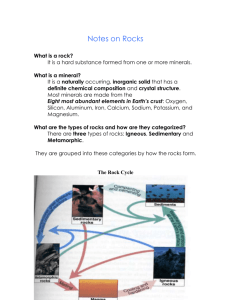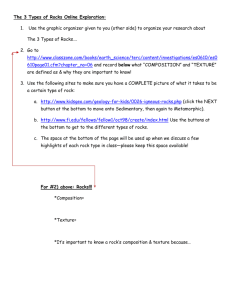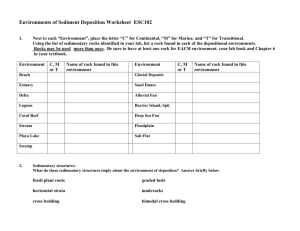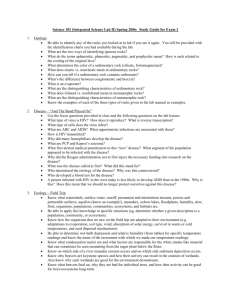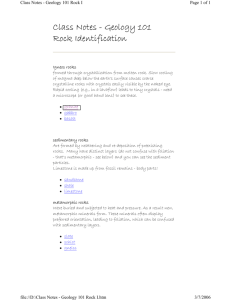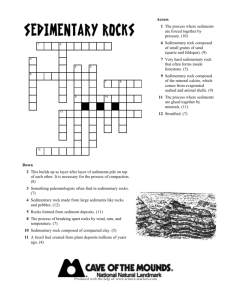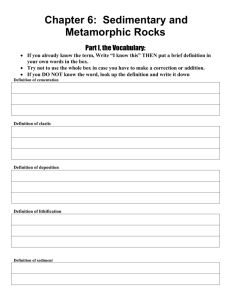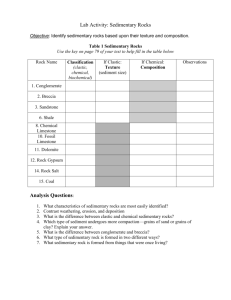Rock Cycle
advertisement
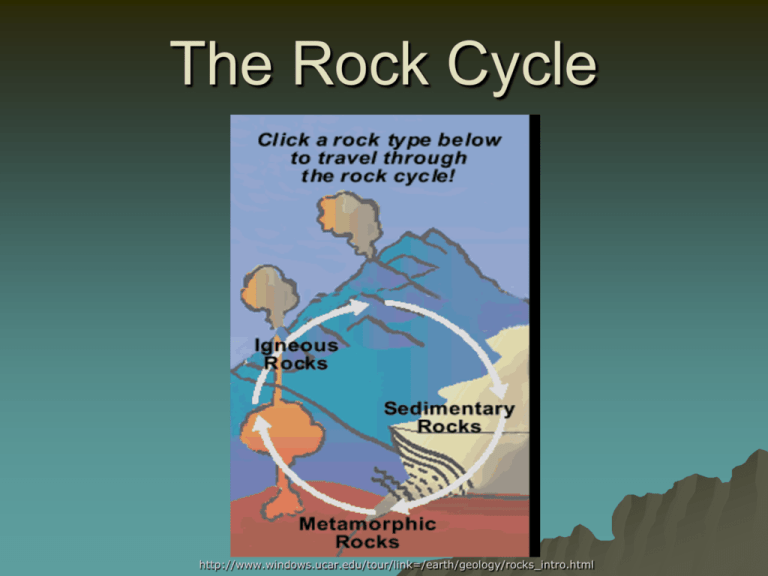
The Rock Cycle http://www.windows.ucar.edu/tour/link=/earth/geology/rocks_intro.html Rock Cycle Rock: Earth material made of minerals, glass or organic matter Rock Cycle: the process by which, over many years, Earth materials change back and forth among magma, igneous rocks, sediments, sedimentary rocks and metamorphic rocks Igneous Rocks: rock formed when magma or lava cools Lava: molten rock from a volcano flowing on Earth’s surface Magma: molten rock beneath Earth’s surface Coarse Grained Mineral grains large enough to be seen with the unaided eye (Phaneritic): Granite or Gabbro Fine Grained Mineral grains too small to be seen with the unaided eye (Aphanitic): For example: Rhyolite or Basalt Glassy Cooled so quickly that no crystals were able to be formed Obsidian or Pumice Scoria Sedimentary Rocks: rock formed when sediments become pressed or cemented together Sediments: loose materials such as rock fragments and mineral grains that have been transported by wind, water, or glacier Weathering: the breaking of rocks into smaller pieces, either mechanically or chemically Erosion: the process that moves weathered rocks from one location to another Deposition: the build up of sediments on the bottoms of lakes, valleys and the ocean floor usually in layers Compaction: sedimentary rockforming process that occurs when layers of sediment become compressed by the weight of layers above them Cementation: sedimentary rockforming process in which sediments are glued together by minerals deposited between the sediments Three types of Sedimentary Rocks: Clastic Sedimentary Rock: made of broken fragments of plants, animals, and primarily other rocks Examples of Clastic Sedimentary Rocks Conglomerate- composed of rounded, pebble-sized fragments that are held together by a cement Examples of Clastic Sedimentary Rocks Breccia - composed of angular, pebblesized fragments that are held together by a cement Examples of Clastic Sedimentary Rocks Sandstone – composed of small mineral grains (usually quartz) that are cemented together. Examples of Clastic Sedimentary Rocks Shale – made of flaky clay particles that compress into flat layers Chemical Sedimentary Rocks made from minerals precipitated from a solution or are left behind when a solution evaporates – minerals left behind form rocks called evaporites Rock salt (halite) Examples of Organic Sedimentary Rock Limestone Fossiliferous Limestone Chalk Example of Organic Sedimentary Rock Coal - forms from plant remains that are buried before they decay. The plant layers are then compacted into matter that is composed mostly of carbon Metamorphic Rock: rock formed from existing rock when the temperature or pressure changes Local Metamorphism metamorphism that affects relatively small volumes of rock (less than 100 km³) Examples of Metamorphic Rocks Slate – pressure exerted on shale (claystone/ mudstone) Schist – high heat and pressure exerted on slate http://library.thinkquest.org/05aug/00461/images/slate.jpg (both with foliated texture) http://www.windows.ucar.edu/tour/link=/earth/geology/images/Schist_mica_jpg_image.html Examples of Metamorphic Rocks Quartzite – metamorphosed quartz sandstone (looks like fine crystalline structure) http://www.answersincreation.org/curriculum/geology/images/Quartzite_2_jpg.jpg Marble – formed from the compression of limestone (looks like numerous calcite crystals) (both with nonfoliated texture) http://www.answersincreation.org/curriculum/geology/images/Marble_2_jpg.jpg

